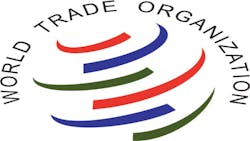NEW DELHI - India's commerce minister accused the United States of "unacceptable" trade protectionism Tuesday as a U.S. official travelled to India on a mission to repair ties following an ugly diplomatic row.
Indian minister Anand Sharma also said New Delhi was fully compliant with the World Trade Organization's rules on intellectual property but would "never accept" stricter measures on patent issues.
While describing the U.S. as a "major economic strategic partner," Sharma told a news conference that India believes Washington is displaying "high and unacceptable protectionism" on some issues.
The minister made the charge as Nisha D. Biswal, U.S. Assistant Secretary of State for South and Central Asia, was set to be the most high-profile U.S. visitor to New Delhi since the row over the arrest of an Indian diplomat in New York in December.
The Indian-born official admitted before her arrival that the countries had "real challenges" to overcome as they seek to move on from the diplomat dispute. Devyani Khobragade was arrested and strip-searched on suspicion of visa fraud involving her domestic helper.
The detention and treatment of the envoy sparked one of the worst rifts in years between the world's biggest democracies and led India to take a series of measures targeting U.S. embassy staff and interests in January.
Several planned trips by Indian and U.S. officials have since been cancelled and a fresh trade dispute has further complicated a relationship that had grown closer over the last decade.
Spotlight on Drugs Sector
Sharma singled out U.S. complaints over Indian intellectual property protection, particularly in the drug sector, as one issue dividing the two nations.
India has a huge generic drugs industry which turns out copies of life-saving drugs, mainly for the developing world.
Sharma said India is fully compliant with the world trade body's 2005 TRIPS agreement (Trade-Related Aspects of Intellectual Property Rights) but "will never accept" so-called "TRIPS-plus" standards.
TRIPS-plus would give protection to moves by drug companies such as "ever-greening" -- granting new patents to existing drugs for minor tweaks to their manufacture.
Patient rights advocates have accused the U.S. of seeking to strong-arm India and other generics-producing countries such as Thailand into curtailing production of cancer and other vital medicines.
India is providing "life-saving medicines at affordable prices," Sharma said, adding that India can also never accept a "diluted" TRIPS agreement.
Writing in The Times of India newspaper ahead of her three-day trip, Biswal called on India to provide stronger patent protection.
Last month, New Delhi reacted furiously to a threat of sanctions by the U.S. Trade Representative's office over India's allegedly weak protection of intellectual property rights and preference for domestic producers.
"Stronger enforcement of intellectual property and patent protection is not just good for American companies but will also protect India's entrepreneurs, content creators and investors," Biswal wrote.
Washington said last month it was filing a second case at the WTO over domestic content requirements in New Delhi's solar program.
Biswal added while there had been significant progress in ties, "that does not mean our relationship does not have real challenges to overcome."
She said the countries must sort out their differences through healthy and vigorous public debate that "befits our values."
While bilateral trade has grown to hit almost $100 billion a year, Biswal said it was time to create a more open environment to boost commercial exchanges.
Copyright Agence France-Presse, 2014
About the Author
Agence France-Presse
Copyright Agence France-Presse, 2002-2025. AFP text, photos, graphics and logos shall not be reproduced, published, broadcast, rewritten for broadcast or publication or redistributed directly or indirectly in any medium. AFP shall not be held liable for any delays, inaccuracies, errors or omissions in any AFP content, or for any actions taken in consequence.
